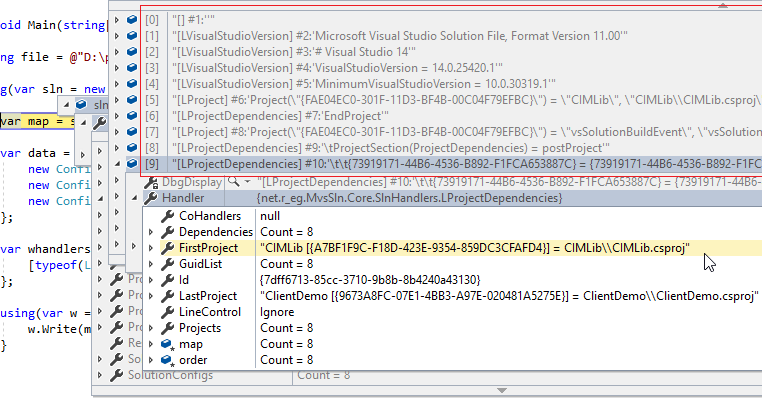-
-
Notifications
You must be signed in to change notification settings - Fork 29
SlnWriter
When loading .sln file, MvsSln's parser can also co-generate the map of the analyzed data if the corresponding option is activated.
Each parsed line in this map represents a section containing the handler that processed that line and/or raw access through wrapper. For example:

Note the following,
-
Everything from this set can be overridden using any custom handlers (aka readers, ~ ISlnHandler)
-
This map, in turn, can be used for modifications using any other custom handlers (aka writers, ~ IObjHandler). For example, updating solution configurations:
Dictionary<Type, HandlerValue> whandlers = new()
{
[typeof(LSolutionConfigurationPlatforms)] = new(new WSolutionConfigurationPlatforms(data)),
};
// use LSolutionConfigurationPlatforms = WSolutionConfigurationPlatforms
using SlnWriter w = new(whandlers);
await w.WriteAsStringAsync(sln.Result.Map); // reuse generated sln.Result.MapIf the map does not exist, for example .sln is created from scratch, then you also need to create it manually.
Modern 2.7+ provides SMap wrapper in order to control sections easily so it's all very simple like:
map.Add
(
SMap.AddType.Before,
typeof(LExtensibilityGlobals),
new Section(new LMyHandler()) // place it before LExtensibilityGlobals
);But even in older versions this was a regular list like:
List<ISection> map =
[
new Section(new LProject()),
new Section(new LSolutionConfigurationPlatforms()),
new Section(new LProjectConfigurationPlatforms()),
...
];2.7+ SlnWriter got a default skeleton. You no longer need to create a new map just to apply your handlers if you simply have nothing to reuse, e.g. sln.Result.Map above.
Default skeleton defines a empty map that contains the described handlers, with their order. Everything you need to create from scratch.
Moreover, SlnWriter will also merge the map and skeleton when saving the result:
await w.WriteAsync(); // write using the default skeleton
await w.WriteAsync(map); // write using map after merging with the default skeletonNote default skeleton can be changed to any other if needed.
Except where otherwise noted, wiki content is licensed under a Creative Commons Attribution 4.0 International License. (CC BY 4.0).